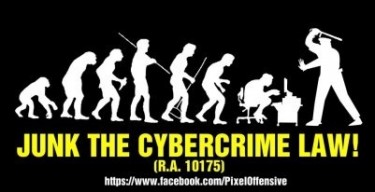The Philippine government is ready to submit an “enhanced version” of the controversial Cybercrime Prevention Act in response to the widespread public and internal opposition to the law.
Signed into law last September 2012, the Cybercrime Prevention Act (Republic Act 10175) sought to strengthen the capacity of law enforcement authorities to combat cybercrime and cyber terrorism, with a focus on crimes that seriously threaten national security and the local economy.
Under the law, individuals suspected of committing crimes (on or offline) could be subject to online surveillance; websites that violated the law’s many provisions could face indefinite blocking by government authorities. Many crimes would have received higher penalties when committed online than they would offline or through traditional media.
Two weeks ago, the Department of Justice (DOJ) announced that it will drop the online libel provision in order to focus on organized cybercrime. The department also plans to remove provisions on child pornography and cyber-squatting since these issues are already covered by existing laws.
Upon its release, the law was immediately criticized by journalists, netizens, and activists for containing provisions that undermine free expression, privacy and other universal human rights online. Specifically, they questioned the last-minute insertion of provisions on libel and the delegation of power to the government to take down websites and restrict access to computer data systems suspected of violating the law. Human rights groups added that the provision on the real-time collection of online communications traffic data in the absence of a court order is a violation of privacy rights.
Fifteen petitions were filed in the Supreme Court questioning the constitutionality of the law. The court subsequently issued a temporary restraining order (TRO) which prevented the government from implementing the law. The TRO is still in effect today.
Some groups welcomed the news about the law’s “enhancement”. But others still pressed for the law to be scrapped altogether.
For veteran journalist Luis Teodoro, a remaining provision that would allow the government to block a website for an indefinite period is equally sinister and should be removed as well:
…that particular provision requires outright repeal as much as the provisions on libel. It gives DOJ the unprecedented power of acting as both judge (it is empowered to decide what online utterances are libelous) and executioner (it can block or take down the website or blog where the material it deems “offensive” appeared).
He also pushed for the surveillance provision in the law to be dropped:
Equally dangerous is the power to monitor websites and blogs the Act gives the Philippine National Police (PNP). Because the PNP can’t possibly monitor all the blogs and websites online, it’s likely to limit its monitoring to sites and blogs critical of government and/or its agencies and institutions, thus giving its monitoring power a political character. The DOJ, however, is silent on that particular provision
Since Congress will adjourn session next week, the proposed amendments will not be tackled until August. Meanwhile, many netizens are still hoping that the Supreme Court will soon declare the Cybercrime Prevention Act unconstitutional.





5 comments